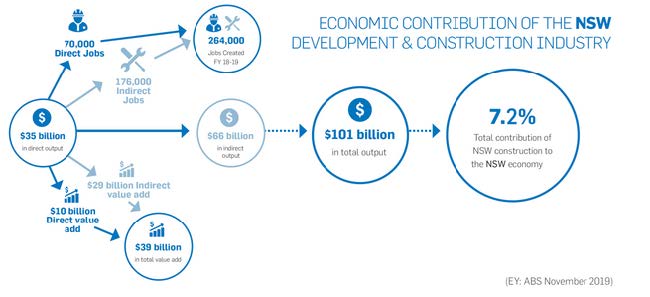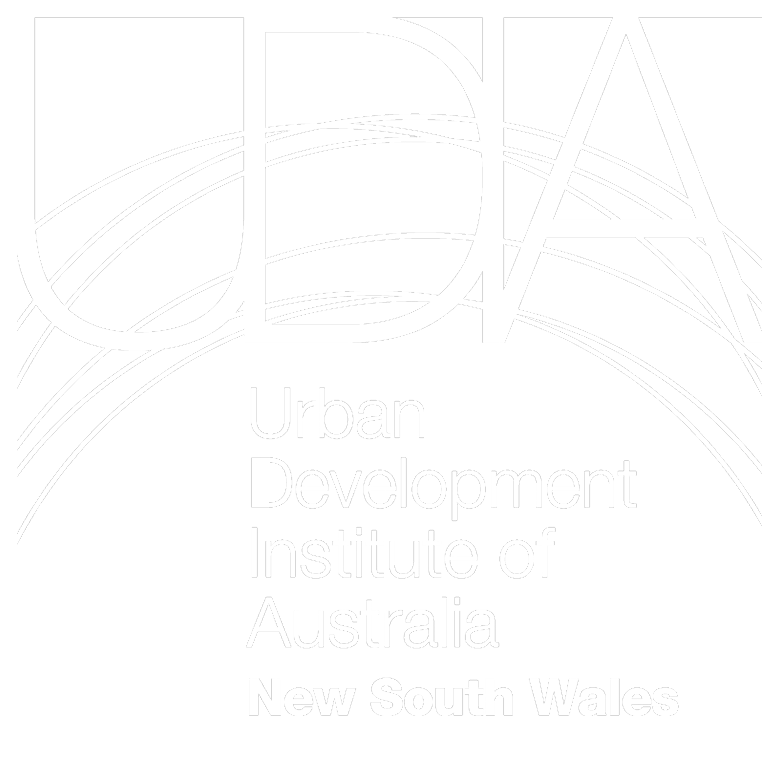A housing led recovery to COVID-19

The NSW Development Sector already contributes 7.2% of the NSW economy and it is an essential industry, which has the potential to contribute even greater amounts over the next few months and lead the State’s recovery from the broad ranging impacts of COVID-19. This will require concerted actions from the government to keep the sector moving and setting up the sector to deliver the kick-start towards recovery. Our action plan comprises of three phases and ten key actions for government.
First Phase: Immediate actions for government
1. Continue to regard the development sector as essential by keeping construction sites open and continuing planning activities. Keeping building, construction and development sites open and operational for as long as is safe to do so, recognises the deep capability within the industry and its workforce to implement health, safety and social distancing measures effectively. Additionally, it the NSW Government must acknowledge that all worksites are not the same. There are differences between a commercial, multi-level construction site, and a land development site and this should be considered in the event of any site shutdowns.
2. Minimise uncertainty by extending the section 7.11 cap by 4 years, while investing in local infrastructure to grow jobs and housing. UDIA has commissioned costings by PwC on this policy in normal market conditions which demonstrated that this would cost approximately $78 million per annum.
3. Delay payment of all Government and Council contributions and charges for development projects. Delaying payments until prior to the release of land registration or prior to release of an Occupation Certificate for dwellings to support cashflow.
4. Finalise rezoning and approvals now to ensure there are shovel-ready projects for recovery, by investing in private sector resources. UDIA has provided the NSW Government with a preliminary list of projects that require limited
planning intervention to be delivered, which can restore a construction and project pipeline for the State. We encourage government to invest in utilising private sector resources to fast-track assessment times.
5. Invest in catalytic infrastructure projects, while preparing business cases and designs so projects are ready to go. UDIA’s Building Blocks report identified enabling infrastructure projects that were delaying housing supply. We believe an injection into the Housing Acceleration Fund (HAF), with scoped projects that will fast-track development and support Councils to co-fund local infrastructure will provide a substantial boost to housing supply. There is $2.6 billion raised from infrastructure contributions that is sitting idle in Council bank accounts in the Hunter, Sydney, and Illawarra regions, which can be leveraged with the HAF fund to accelerate projects. Forward funding utility projects will help unlock projects and provide a return to NSW Treasury over time.
Second Phase: Short-term actions for government
6. Use step-in powers to fast-track rezoning and unlock housing supply and development activity. The Secretary for the Department of Planning, Industry and Environment must use their step-in powers if assessments are delayed by State Government agencies or councils so that projects can be approved to kick-start the housing pipeline.
7. Ensure utility agencies communicate their delivery program to ensure that there are no infrastructure gaps. In the past, we have seen haphazard infrastructure delivery, so housing and jobs are not delivered. This could be avoided through implementing an Urban Development Program (UDP), it is more critical than ever that infrastructure delivery is aligned so projects do not have a missing piece of infrastructure. UDIA is partnering with utilities and local councils to deliver a UDP for South West Sydney to enable clear visibility of the infrastructure frontier.
8. Support financing for projects with presales at 50% of debt coverage to unlock initial capital and get projects moving. With significant uncertainty in the employment market, it will be increasingly difficult to secure traditional presale hurdles. The NSW Government should invest in projects by offering debt financing to enable projects to commence construction. Alternatively, equity financing could be offered with some affordable housing contribution.
Third Phase: Restoring Confidence
In the medium-term we are seeking actions that will restore confidence in the marketplace and help support new homebuyers to return to the market:
9. Reactivate the new housing market, with a Home Builders Bonus for twenty-four months, which would exclude the first $650,000 from the stamp duty assessment for new and off-the-plan sales. This will encourage homebuyers to invest in new housing that promotes jobs.
10. Encourage foreign investment in housing and jobs by removing the foreign investor surcharges and stamp duty on new and off-the-plan sales, as these contribute to housing supply. In the past, foreign purchasers accounted for a substantial portion of pre-sales.
Our message to the NSW Government
COVID-19 is generating an unprecedented array of economic pressures and impacts around the world. Here in NSW the development sector is experiencing supply chain disruptions and escalating marketplace uncertainty. This is resulting in project launch delays/abandonments, declining sales and now increasing numbers of employees are having to be stood down across the economy. UDIA expects further uncertainty as potential buyers begin to think about income security. All of this impacts the ability of the industry to help drive the strong economic rebound that NSW will need.
The development sector stands ready to support a construction-led recovery across NSW, however we face significant challenges with slow approval times and an inefficient charging regime. Focussed action now to eliminate uncertainty, deliver rezoning and development approvals will help place the NSW economy in a strong position for a housing and construction-led recovery beyond the COVID-19 health emergency.
The urban development sector drives economic growth in NSW, contributing 7.2% to GSP and currently supports over 246,000 jobs. At the start of the year we wrote to the NSW government urging productivity boosting action in the sector to fortify the State against economic risks by making planning work, extending the infrastructure funding cap and investment in Western Sydney.
UDIA NSW has developed the Project Bounce Back COVID-19 Action Plan that we urge the Government to consider and give confidence to the sector so that we can maximise employment during each phase of this crisis to position and support the economy to ramp up for recovery.
As we all seek to battle this virus through increased social distancing there will be inevitable impacts on business. However, we urge you and the NSW Government to continue to emphasise that construction and planning activities are essential services. The development industry has long lead times, so action now can help support continued project delivery to preserve jobs, even as sales are challenging and a strategy to deliver phased actions as the health crisis is overcome, will help restore confidence to this $101 billion economic engine in NSW.

